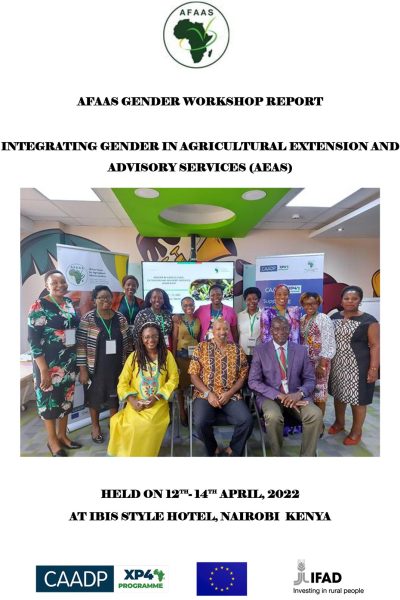Social exclusion and general poverty are key deterring factors limiting the realization of agriculture’s full potential as the engine for Africa’s economic development. In 2014, African Forum for Agricultural Advisory Services (AFAAS) commissioned seven country scoping studies on gender-responsive approaches to Rural Advisory Services (RAS) in Africa. The aim of the studies was to collect secondary data on existing policies, programmes, approaches, and tools for gender-responsive provision of RAS to farmers most especially the women and youth.
AFAAS also developed the Gender Mainstreaming Strategy 2015-2019 to support the processes of promoting gender equality in Agricultural Extension and Advisory System (AEAS). It is with such commitment that AFAAS planned a 3 –day hybrid workshop on “Integrating Gender in Agricultural Extension and Advisory Services” between the 12th – 14th April 2022 as reflected in the training programme in Annex 1.
The workshop attendance comprised of 10 (9 Females & 1 Male) participants representing the countries of: Nigeria, Uganda, Kenya, Mali, Cameroon, Malawi, Ghana, South Africa, Madagascar, and Zambia. List of participants is in Annex 2. The workshop used a blended approach of face to face and online delivery with a mix of methodologies including power point presentations, video clips, flip charting, practical demonstrations, and group/plenary discussions which were participatory and highly interactive. There was a seamless flow of
content from the two facilitators, Dr. Patricia Bamanyaki and Ms. Adeline Muheebwa who complemented each other and shared personal experiences for clarity and better understanding. All these coupled together made the workshop a successful event as highlighted in the
evaluation results in Annex 3. Each morning started with a recap presented by Ms. Scovia Lindyway Ojoru for purposes of reflection on the key learnings as presented in Annex 4.
Participants expressed their appreciation for the training which increased their level of knowledge and understanding as revealed by the post – assessment results. As a way forward, participants were registered on a WhatsApp group in order to continue engaging and sharing
information as a Gender Community of Practice. Participants were also encouraged to finalize their country action plans so as to prioritize key actions to fit in the new AFAAS Gender Strategy.

